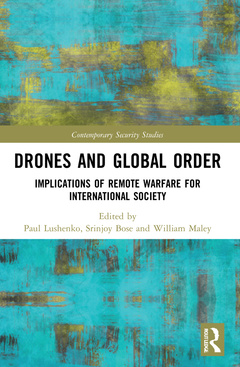Drones and Global Order Implications of Remote Warfare for International Society Contemporary Security Studies Series
Coordonnateurs : Lushenko Paul, Bose Srinjoy, Maley William

This book explores the implications of drone warfare for the legitimacy of global order.
The literature on drone warfare has evolved from studying the proliferation of drones, to measuring their effectiveness, to exploring their legal, moral, and ethical impacts. These "three waves" of scholarship do not, however, address the implications of drone warfare for global order. This book fills the gap by contributing to a "fourth wave" of literature concerned with the trade-offs imposed by drone warfare for global order. The book draws on the "English School" of International Relations Theory, which is premised on the existence of a society of states bounded by common norms, values, and institutions, to argue that drone warfare imposes contradictions on the structural and normative pillars of global order. These consist of the structure of international society and diffusion of military capabilities, as well as the sovereign equality of states and laws of armed conflict. The book presents a typology of contradictions imposed by drone warfare within and across these axes that threaten the legitimacy of global order. This framework also suggests a confounding consequence of drone warfare that scholars have not hitherto explored rigorously: drone warfare can sometimes strengthen global order. The volume concludes by proposing a research agenda to reconcile the complex and often counter-intuitive impacts of drone warfare for global order.
This book will be of considerable interest to students of security studies, global governance, and International Relations.
1. Conceptualizing Global Order in an Era of Remote Warfare Paul Lushenko, Srinjoy Bose, and William Maley Part I: Why do states use drone warfare? 2. Realism, Drone Warfare, and the Future of the International System John Hardy 3. International Society’s Challenge of Targeted Killing by Drones Jodok Troy 4. A Blended Interpretation of Drone Warfare Paul Lushenko 5. Drone Warfare and the Human Protection Transnational Legal Order Cecilia Jacob and Nicola Mathieson Part II: How does drone warfare affect global order? 6. Hierarchy, Drones, and Global Order in International Society John Williams 7. Armed Drones and Sovereignty: The Arc of Strategic Sovereign Possibilities Daniel R. Brunstetter and Amélie Férey 8. Drone Warfare and International Humanitarian Law: The U.S., the I.C.R.C, and the Contest over the Global Legal Order Arturo Jimenez-Bacardi 9. Drone Warfare and the Management of Violence William Maley Part III: How can international society best govern drone warfare? 10. Coming Soon to a Theater (of War) Near You: Drones of all Shapes and Sizes Keith L. Carter 11.The Context and Prospects of Regulating Drones in Conflict Michael P. Kreuzer 12. Suleimani’s Choice: The Narrow Permissions and Wider Considerations of Remote Warfare Robert Underwood Part IV: Conclusion 13. The Significance—and Potential—of a Fourth Wave of Drone Warfare Scholarship John Blaxland, Srinjoy Bose,and Paul Lushenko
Paul Lushenko is a U.S. Army Lieutenant Colonel and General Andrew Jackson Goodpaster Scholar at Cornell University, U.S.A.
Srinjoy Bose is Senior Lecturer in Politics and International Relations at the University of New South Wales, Australia.
William Maley is Emeritus Professor at The Australian National University.
Date de parution : 09-2023
15.6x23.4 cm
Date de parution : 12-2021
15.6x23.4 cm
Thèmes de Drones and Global Order :
Mots-clés :
remote warfare; global order; drones; international society; targeted killing; coercion; Stop Killer Robots; legitimacy; International Humanitarian Law; National Security Strategy; Drone Warfare; Vice Versa; Muslim World; Mass Atrocity Crimes; Atrocity Crimes; Drone Strike; Unjust Combatants; Commercial Drones; Armed Drones; Networked Drones; Autonomous Weapons Systems; Unarmed Drones; Jodok Troy; Drone Technology; Global Legal Order; Realist International System; Remote Killing; Federal Aviation Administration; Violent Extremist Organizations; Preventive Self-defense; Lethal Autonomous Weapons Systems



